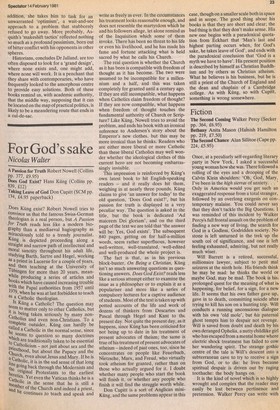For God's sake
Nicolas Walter
A Passion for Truth Robert Nowell (Collins pp. 377, £9.95) Does God Exist? Hans Kiang (Collins pp. 839, £12) Taking Leave of God Don Cupitt (SCM pp. 174, £4,95 paperback) Does Kung exist? Robert Nowell tries to convince us that the famous Swiss-German theologian is a real person, but A Passion for Truth reads less like a modern biography than a mediaeval hagiography as miraculously told to a trendy journalist. Kiing is depicted proceeding along a straight and narrow path of intellectual and Moral sanctity throughout his adult life, studying Barth, Sartre and Hegel, working as a priest in Lucerne for a couple of years, and then teaching at the University of Tubingen for more than 20 years, meanwhile producing a series of articles and books which have caused increasing trouble with the Papal authorities from 1957 until 1979, when he was at last forbidden to teach as a Catholic theologian. Is Kting a Catholic? The question may see.in to matter only to other Catholics, but it Is being taken seriously by many nonCatholics and even non-Christians. To a complete outsider, Ming can hardly be Called a Catholic in the normal sense, since .seems to question so many doctrines which are traditionally taken to be essential to ,Catholicism — not just about sex and the priesthood, but about the Papacy and the Church, even about Jesus and Mary. If he is 1a, Catholic, it is in the sad sense of that long go.Ing back through the Modernists and ,J4e original Protestants to the earliest neretics. Yet even the Vatican thinks he is a Catholic in the sense that he is still a ember of the Church and indeed a priest, ond he continues .to teach and speak and write as freely as ever. In the circumstances his treatment looks reasonable enough, and does not resemble the martyrdom which he and his followers allege, let alone remind us of the Inquisition which some of them invoke. There has been no threat to his life or even his livelihood, and he has made his fame and fortune attacking what is held sacred by what he calls his Church.
The real question is whether the Church as it has been is compatible with freedom of thought as it has become. The two were assumed to be incompatible for a millennium and a half, and this was taken completely for granted until a century ago. If they are still incompatible, what happens when Catholics claim freedom of thought? If they are now compatible, what happens when freedom of thought touches the fundamental authority of Church or Scripture? Like Kiing, Nowell tries to avoid the problem, and ends his book with an ironical reference to Andersen's story about the Emperor's new clothes, but this may be more ironical than he thinks. Readers who are either more liberal or more Catholic than these liberal Catholics may well wonder whether the ideological clothes of this current hero are not becoming embarrassingly invisible.
This impression is reinforced by Kting's own latest book to hit English-speaking readers — and it really does hit them, weighing in at nearly three pounds. Kung claims to give 'an answer for today' to the old question, 'Does God exist?', but his passion for truth is displayed in a very peculiar way. The question is asked in the title, but the book is dedicated 'Ad maiorem Del gloriam', and on the third page of the text we are told that 'the answer will be: Yes, God exists'. The subsequent 840 pages, getting on for half-a-million words, seem rather superfluous, however well-written, Well-translated, well-edited and well-produced the whole project is.
The fact is that, as in his previous block-buster, On Being a Christian, Kiing isn't so much answering questions as questioning answers. Does God Exist? reads less like a serious attempt either to examine the issue as a philosopher or to explain it as a pOpulariser and more like a series of compulsory lectures for a captive audience of students. Most of the text is taken up with potted accounts of the life and work of dozens of thinkers from Descartes and Pascal through Hegel and Kant to the present day. Not quite the present day, as it happens, since Ming has been criticised for not being up to date in his treatment of present advocates of theism; the same is true of his treatment of present advocates of atheism — indeed of past ones, too, since he concentrates on people like Feuerbach, Nietzsche, Marx, and Freud, who virtually took atheism for granted, rather than on those who actually argued for it. I doubt whether many people who start the book will finish it, or whether any people who finish it will find the struggle worth while.
Don Cupitt is a sort of Anglican miniMing, and the same problems appear in this case, though on a smaller scale both in space and in scope. The good thing about his books is that they are short and clear; the bad thing is that they don't make sense. His new one begins with a paradoxical quotation from Eckhart that 'Man's last and highest parting occurs when, for God's sake, he takes leave of God', and ends with the paradoxical conclusion that 'God is a myth we have to have'. His present position is described by himself as Christian Buddhism and by others as Christian atheism. What he believes is his business, but he is still a priest of the Church of England and the dean and chaplain of a Cambridge college. As with Ming, so with Cupitt, something is wrong somewhere.






































 Previous page
Previous page